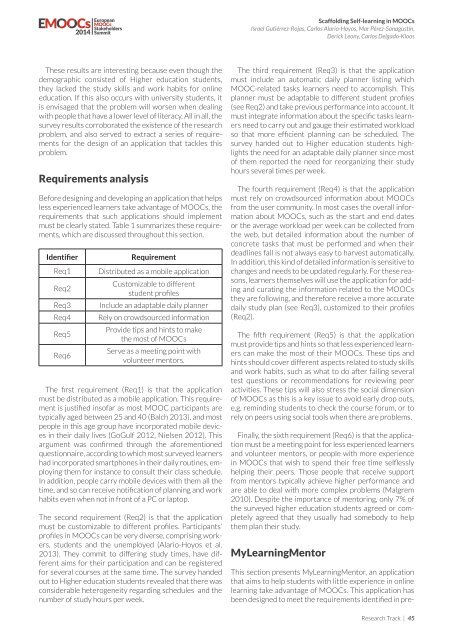zmWmQs
zmWmQs
zmWmQs
Create successful ePaper yourself
Turn your PDF publications into a flip-book with our unique Google optimized e-Paper software.
Scaffolding Self-learning in MOOCs<br />
Israel Gutiérrez-Rojas, Carlos Alario-Hoyos, Mar Pérez-Sanagustín,<br />
Derick Leony, Carlos Delgado-Kloos<br />
These results are interesting because even though the<br />
demographic consisted of Higher education students,<br />
they lacked the study skills and work habits for online<br />
education. If this also occurs with university students, it<br />
is envisaged that the problem will worsen when dealing<br />
with people that have a lower level of literacy. All in all, the<br />
survey results corroborated the existence of the research<br />
problem, and also served to extract a series of requirements<br />
for the design of an application that tackles this<br />
problem.<br />
Requirements analysis<br />
Before designing and developing an application that helps<br />
less experienced learners take advantage of MOOCs, the<br />
requirements that such applications should implement<br />
must be clearly stated. Table 1 summarizes these requirements,<br />
which are discussed throughout this section.<br />
Identifier<br />
Req1<br />
Req2<br />
Req3<br />
Req4<br />
Req5<br />
Req6<br />
Requirement<br />
Distributed as a mobile application<br />
Customizable to different<br />
student profiles<br />
Include an adaptable daily planner<br />
Rely on crowdsourced information<br />
Provide tips and hints to make<br />
the most of MOOCs<br />
Serve as a meeting point with<br />
volunteer mentors.<br />
The first requirement (Req1) is that the application<br />
must be distributed as a mobile application. This requirement<br />
is justified insofar as most MOOC participants are<br />
typically aged between 25 and 40 (Balch 2013), and most<br />
people in this age group have incorporated mobile devices<br />
in their daily lives (GoGulf 2012, Nielsen 2012). This<br />
argument was confirmed through the aforementioned<br />
questionnaire, according to which most surveyed learners<br />
had incorporated smartphones in their daily routines, employing<br />
them for instance to consult their class schedule.<br />
In addition, people carry mobile devices with them all the<br />
time, and so can receive notification of planning and work<br />
habits even when not in front of a PC or laptop.<br />
The second requirement (Req2) is that the application<br />
must be customizable to different profiles. Participants’<br />
profiles in MOOCs can be very diverse, comprising workers,<br />
students and the unemployed (Alario-Hoyos et al.<br />
2013). They commit to differing study times, have different<br />
aims for their participation and can be registered<br />
for several courses at the same time. The survey handed<br />
out to Higher education students revealed that there was<br />
considerable heterogeneity regarding schedules and the<br />
number of study hours per week.<br />
The third requirement (Req3) is that the application<br />
must include an automatic daily planner listing which<br />
MOOC-related tasks learners need to accomplish. This<br />
planner must be adaptable to different student profiles<br />
(see Req2) and take previous performance into account. It<br />
must integrate information about the specific tasks learners<br />
need to carry out and gauge their estimated workload<br />
so that more efficient planning can be scheduled. The<br />
survey handed out to Higher education students highlights<br />
the need for an adaptable daily planner since most<br />
of them reported the need for reorganizing their study<br />
hours several times per week.<br />
The fourth requirement (Req4) is that the application<br />
must rely on crowdsourced information about MOOCs<br />
from the user community. In most cases the overall information<br />
about MOOCs, such as the start and end dates<br />
or the average workload per week can be collected from<br />
the web, but detailed information about the number of<br />
concrete tasks that must be performed and when their<br />
deadlines fall is not always easy to harvest automatically.<br />
In addition, this kind of detailed information is sensitive to<br />
changes and needs to be updated regularly. For these reasons,<br />
learners themselves will use the application for adding<br />
and curating the information related to the MOOCs<br />
they are following, and therefore receive a more accurate<br />
daily study plan (see Req3), customized to their profiles<br />
(Req2).<br />
The fifth requirement (Req5) is that the application<br />
must provide tips and hints so that less experienced learners<br />
can make the most of their MOOCs. These tips and<br />
hints should cover different aspects related to study skills<br />
and work habits, such as what to do after failing several<br />
test questions or recommendations for reviewing peer<br />
activities. These tips will also stress the social dimension<br />
of MOOCs as this is a key issue to avoid early drop outs,<br />
e.g. reminding students to check the course forum, or to<br />
rely on peers using social tools when there are problems.<br />
Finally, the sixth requirement (Req6) is that the application<br />
must be a meeting point for less experienced learners<br />
and volunteer mentors, or people with more experience<br />
in MOOCs that wish to spend their free time selflessly<br />
helping their peers. Those people that receive support<br />
from mentors typically achieve higher performance and<br />
are able to deal with more complex problems (Malgrem<br />
2010). Despite the importance of mentoring, only 7% of<br />
the surveyed higher education students agreed or completely<br />
agreed that they usually had somebody to help<br />
them plan their study.<br />
MyLearningMentor<br />
This section presents MyLearningMentor, an application<br />
that aims to help students with little experience in online<br />
learning take advantage of MOOCs. This application has<br />
been designed to meet the requirements identified in pre-<br />
Research Track | 45


